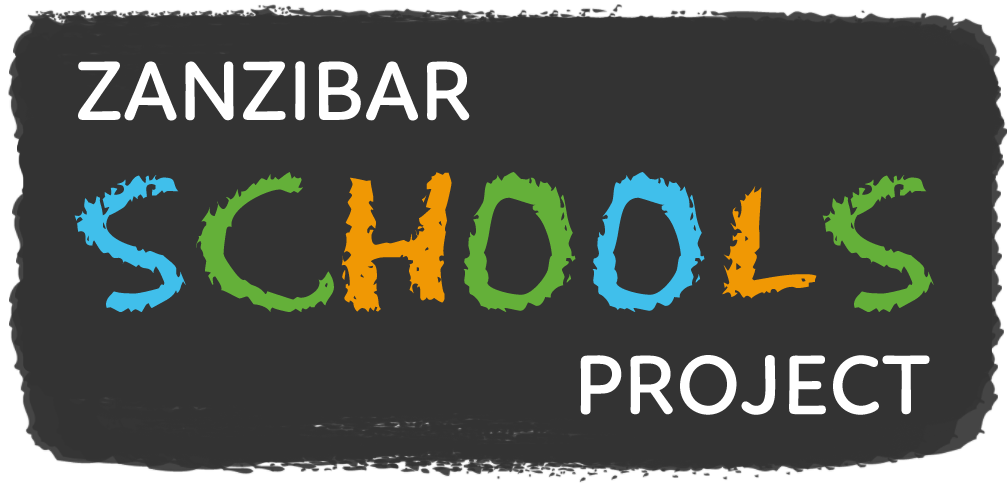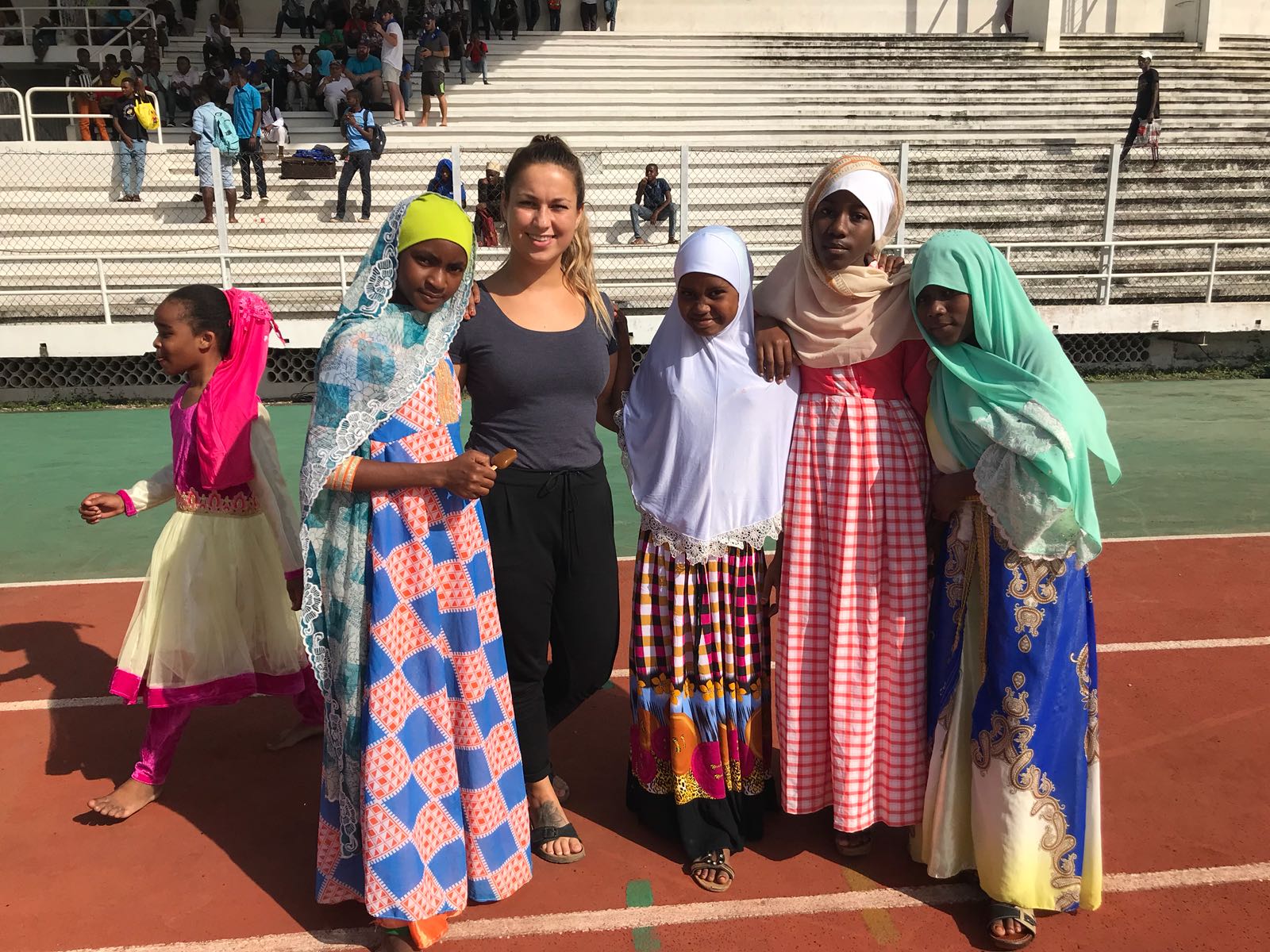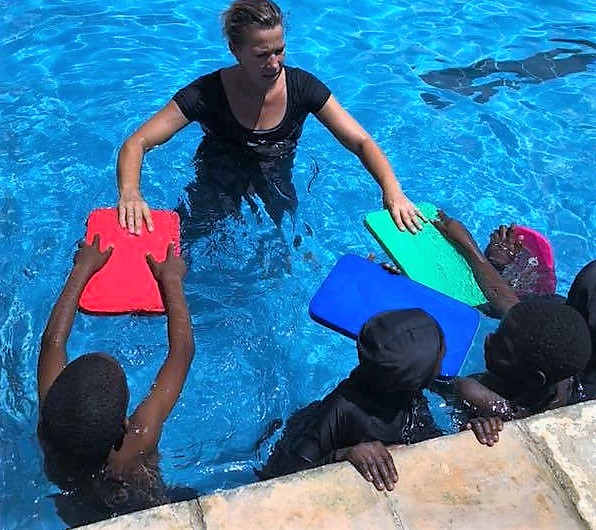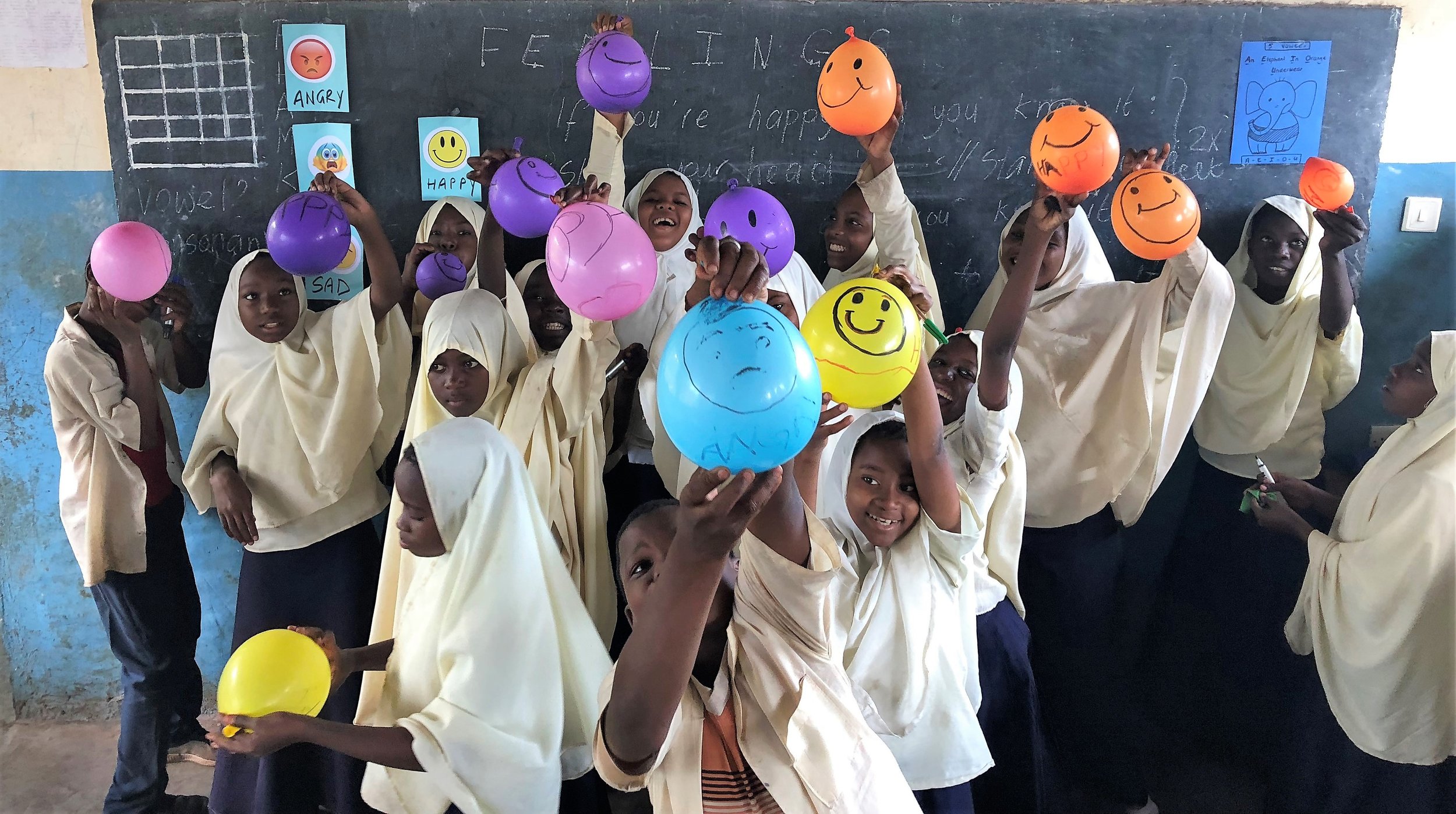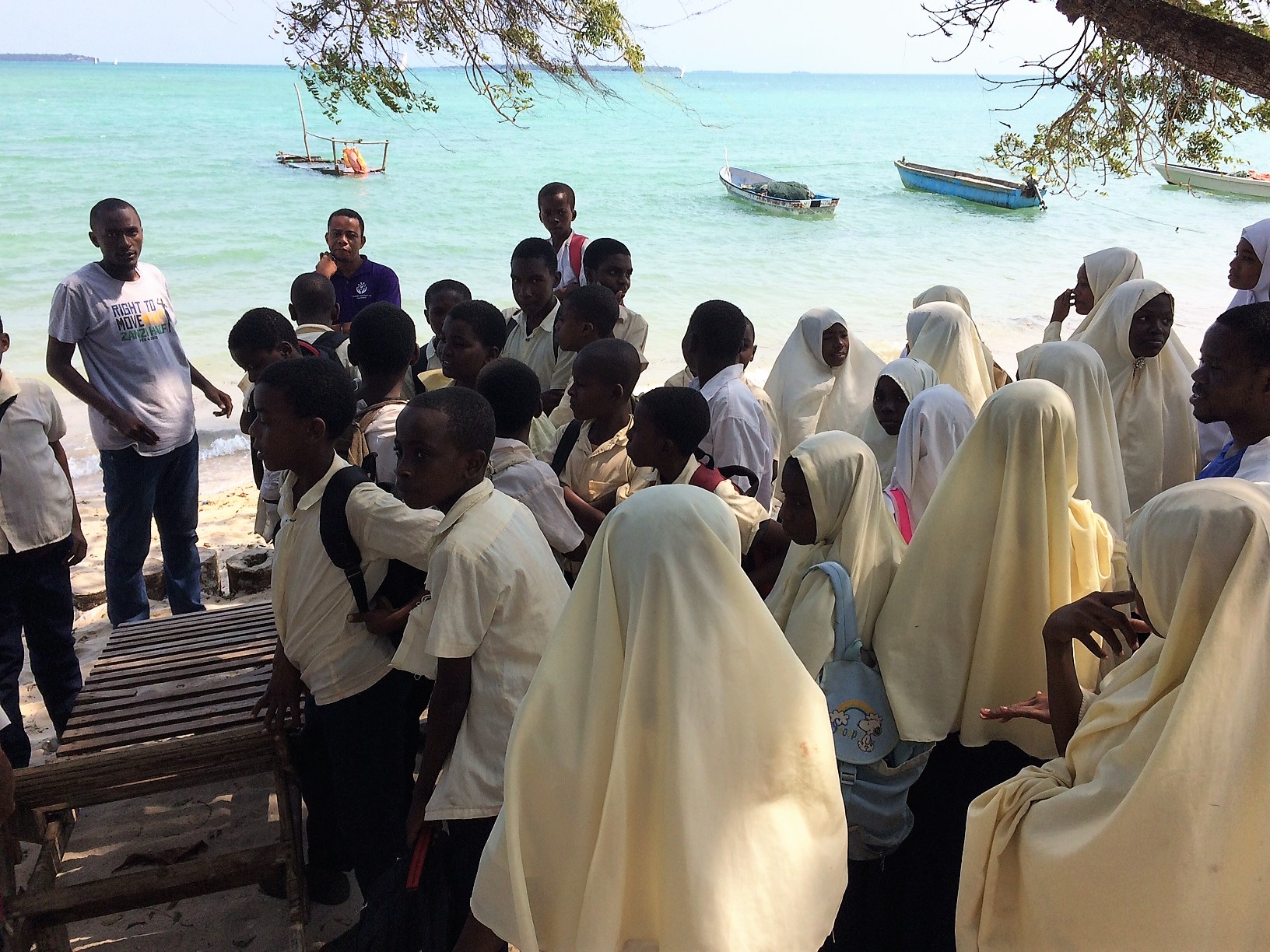How long have you been volunteering in Zanzibar and what’s the ideal time to spend there?
Carin: I did a 3 months project in Kenya and now I’m in Zanzibar for 3 months. There are a lot of similarities, but also differences. What’s the same? Well first of all, the climate! Don’t underestimate the effect of the climate on your body!! Take time to adjust to the heat and drink plenty of water! And you have to slow your normal speed, and I’m not talking about the traffic 😊. You get tired easily and can’t expect to do the same amount of work as you’re used to at home. This is also because in Africa there is a whole different mentality. It’s pole pole, which means ‘slowly slowly’...you have to be patient when you want to get something done. For example I had to go to the garage with the car and they start by saying that is a half days work and that you can pick up the car tomorrow (that was on a Tuesday) but in the end the car was actually fixed on Saturday! It can be frustrating sometimes!!
Stina: I’ve been volunteering at Safari English Club (SEC) for 5 months and I feel lucky to be able to spend a long time on the project, but I know it’s not always possible. In my experience, I’d say the ideal time to spend on the project is at least 2 months. However, all help is valuable, for example we had someone for a short time who helped us in an assistant capacity.
What were the highlights of your time in Zanzibar?
Carin: A big difference between Kenya and Zanzibar is that Zanzibar is generally much safer. I’ve access to a car here (provided by the project) and I can safely drive to Stone Town in the evening. There are more roads than in Kenya, although many roads in Zanzibar also have large potholes. When I was in Kenya I didn’t have a social network outside of the project. In contrast, in Zanzibar I’ve been introduced to the Rotary club and they involve me in their activities. I helped with a Golf event and met many people there. And you meet other volunteers and really work together. I’m staying in Mbweni, just outside Stone Town, a nice area, close to the International School, with a large swimming pool that you can use for a very reasonable price. Some other volunteers stay in Town in a kind of hostel, can also be great (depends on ones budget, Mbweni is a bit more expensive).
Zanzibar is like a big village actually, before you know it, you know many people who either live here, or are volunteering just like me. Volunteering with SEC is a good mix between work and ‘holiday’… 4 times 1 hour and a half doesn’t sound as if you have much to do, but you have to prepare lessons and it takes me some hours to make a good lesson plan. But it’s also very rewarding as you can see you students grow in self-confidence when it comes to speaking English! And when the boys give you flowers and some girls give you a kiss and a hug when they leave the classroom, well….. it makes me happy 😊
Stina: For me, the highlights were the opportunity to work with the kids in a creative way and to take them on school trips. These students come from families with few resources, which makes the volunteering even more worthwhile. Especially when we can offer them trips that take them places they would never otherwise visit. I enjoyed working together with the kids over a long period of time, which gave us the opportunity to get to know one another very well.
Also, it gave me the chance to see how the children develop. My goal was to challenge their creativity and inspire them to use their imagination or express their own opinions. This is very challenging because most kids aren’t allowed to express their own opinions in school or at home. For example, if I asked the more advanced students a very simple question (what I define as simple!) such as what they would like us to do in the future with SEC, most of them really struggled. Even though we might talked about examples it could still be challenging for them to really understand or to express what they actually like to do. But the advantage for me being at SEC for so long was also that the kids got used to the way I tried to challenge them and I could see that they actually got better and better at expressing themselves in one way or another.
What were the highlights of your time when you weren’t volunteering?
Carin: Zanzibar has beautiful beaches, good food, plenty of things to do and very friendly people.
Stina: I spent my free time in Kendwa, in the North of Zanzibar, with my boyfriend who has a house there. Unguja Ukuu is too far away to commute from Kendwa, so I chose (with advice from Ann – and she was right 😉) to get a room in Stone Town. I’m very happy about this decision because I moved into a volunteer house, where I stayed with Jack and Lucie (two other volunteers at Safari English Club). Also, I got to know the other people who lived in the house and we became very good friends. All in all, I’ve really enjoyed my time in Stone Town with my friends and the escape to Kendwa at weekends, so I could enjoy time on the best beaches in Zanzibar.
What kind of person do you think this volunteering opportunity is suitable for?
Carin: You have to be independent. You’re preparing your own lessons; there are some resources available at the school, but sometimes they aren’t really suitable. I enjoy that combination of freedom and responsibility. Every day 30 pairs of eyes look at me and expect me to teach….😊. From that perspective the Kenya project was ‘easier’ as I worked in a Rescue Centre, where kids could be sheltered for a year and my job was to help them to forget about their problems through play. If I compare that with teaching English, the teaching is much more challenging but gives me a greater feeling of satisfaction. (TEFL is a must, if you ask me!)
Besides being patient, you need to be flexible, switch to plan B of even C… (eg last week we planned to watch a movie with the students and just 5 minutes before, there was a power cut). In both countries they speak Swahili and the people really appreciate when you can say some words/sentences in their language. I’m taking Swahili lessons and that helps me to realize how my students must feel when I teach them English.
Stina: A good volunteer is someone who is really interested in getting to know the country and its culture. In addition, volunteers need to be open-minded, outgoing and not afraid to show leadership. Respect and humility are important qualities.
Volunteering is also selfish because it makes people feel good about themselves, which I see as a natural thing, and not necessarily a bad thing. But it’s important for people who volunteer to do what is best for the group they choose to work with, and don’t get carried away of the idea of living in paradise. Because there is also a reality to the paradise most people see when they live in Zanzibar, and that can be challenging for people who don’t know about the deprivation in Zanzibar.
In general it’s important to remember that when someone chooses to get involved with a sensitive group like SEC, they also must leave again and go back home. Educated or not, I still believe that this is a subject all volunteers should be aware of. We can make an impact on the target group that we’re with (and vice versa) but we need to be able to prioritise what’s best for the students and put aside our own needs.
How does the strong Islamic culture impact you?
Carin: Before I went to Zanzibar I was a bit worried how the culture would affect me. When I got there I was surprised by the atmosphere of tolerance, acceptance and mutual respect. They did’t expect me to wear a scarf. The village is even more traditional than the city and we wanted to respect their beliefs, for example we wouldn’t smoke or drink alcohol in public, we covered our shoulders and knees and when we took the students to the beach or swimming pool I decided to wear the same burkini as the girls did.
Stina: This doesn’t really bother me. It’s very different to my own beliefs, but I’ve learned not to judge. I tell people to think this: who is right and who is wrong? People are different and have different beliefs, maybe what is the right way in our eyes, isn’t right in their eyes. But does it even matter? I think adapting and respecting the culture you choose to be in, even though it’s another mind-set to yours. As long as nobody force anything on me and respects my way of living my life, then people can believe in the God they choose. I had some few episodes doing Ramadan with people who was too nosey and a bit judgemental about the fact that I was not fasting even though I didn’t drink or eat anything in public, but that was only a few people. Also, I don’t really like the fact that young girls are kind of forced to cover themselves in a very young age and I get the impression that the people in this culture don’t get the opportunity of choosing their own path. If they want something else in life they get cut out of the family.
What are the challenges/negatives that people have to be prepared to face?
Stina: If it’s your first time in Zanzibar or Tanzania, people need to prepare themselves for a cultural shock. Of course, it depends on your personal experiences. Last year I was in Tanzania for the first-time and I got quite a big cultural shock. I’d travelled in Thailand, central America and lived abroad for 6 months, but I’d never experienced feeling “real” cultural shock before I arrived in Mwanza, Tanzania. Coming from Denmark, I found it overwhelming just going for a walk in the city, taking the bus and shopping.
I believe that people who come to Zanzibar will not have the same shock as staying in a big city as Mwanza, but they should still be prepared that the cultural differences can seem overwhelming at times. The culture is very outgoing, which can seem a bit much if you are from a place like Scandinavia, where people are the complete opposite (don’t talk to strangers, personal space etc.)
In general people in Zanzibar are very nice people, and volunteers need to be careful about one thing… they’ll get addicted to the island and won’t want to leave again 😉
